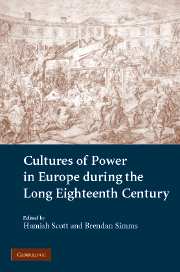Book contents
- Frontmatter
- Contents
- Preface
- List of contributors
- 1 Introduction: culture and power during the long eighteenth century
- 2 When culture meets power: the Prussian coronation of 1701
- 3 Military culture in the Reich, c. 1680–1806
- 4 Diplomatic culture in old regime Europe
- 5 Early eighteenth-century Britain as a confessional state
- 6 ‘Ministers of Europe’: British strategic culture, 1714–1760
- 7 Confessional power and the power of confession: concealing and revealing the faith in Alpine Salzburg, 1730–1734
- 8 The transformation of the Aufklärung: from the idea of power to the power of ideas
- 9 Culture and Bürgerlichkeit in eighteenth-century Germany
- 10 The politics of language and the languages of politics: Latin and the vernaculars in eighteenth-century Hungary
- 11 ‘Silence, respect obedience’: political culture in Louis XV's France
- 12 Joseph II, petitions and the public sphere
- 13 The court nobility and the origins of the French Revolution
- 14 The French Revolution and the abolition of nobility
- 15 Foreign policy and political culture in later eighteenth-century France
- 16 Power and patronage in Mozart's La clemenza di Tito and Die Zauberflöte
- 17 Between Louis and Ludwig: from the culture of French power to the power of German culture, c. 1789–1848
- Index
1 - Introduction: culture and power during the long eighteenth century
Published online by Cambridge University Press: 17 July 2009
- Frontmatter
- Contents
- Preface
- List of contributors
- 1 Introduction: culture and power during the long eighteenth century
- 2 When culture meets power: the Prussian coronation of 1701
- 3 Military culture in the Reich, c. 1680–1806
- 4 Diplomatic culture in old regime Europe
- 5 Early eighteenth-century Britain as a confessional state
- 6 ‘Ministers of Europe’: British strategic culture, 1714–1760
- 7 Confessional power and the power of confession: concealing and revealing the faith in Alpine Salzburg, 1730–1734
- 8 The transformation of the Aufklärung: from the idea of power to the power of ideas
- 9 Culture and Bürgerlichkeit in eighteenth-century Germany
- 10 The politics of language and the languages of politics: Latin and the vernaculars in eighteenth-century Hungary
- 11 ‘Silence, respect obedience’: political culture in Louis XV's France
- 12 Joseph II, petitions and the public sphere
- 13 The court nobility and the origins of the French Revolution
- 14 The French Revolution and the abolition of nobility
- 15 Foreign policy and political culture in later eighteenth-century France
- 16 Power and patronage in Mozart's La clemenza di Tito and Die Zauberflöte
- 17 Between Louis and Ludwig: from the culture of French power to the power of German culture, c. 1789–1848
- Index
Summary
In December 1774, seventeen-year-old Carl August, Prince of Saxe Weimar, met the celebrated young author Johann Wolfgang Goethe in a Frankfurt hotel room. The meeting was cordial, indeed the two men got along together so splendidly that, less than a year later, Goethe accepted the prince's invitation to move to Weimar, where he would spend the rest of his long and incredibly productive life.
I begin with this familiar scene – so beautifully rendered and analysed in Nicholas Boyle's distinguished biography of the poet – because it neatly captures several of the motifs in the complex relationship between culture and power in the eighteenth century. First and most obvious is the persistent significance of the court, whose seductive blend of artistic possibilities and political influence led Goethe to disregard his father's opposition and take up residence in Carl August's small Thuringian state. Second, there is the new significance of public culture, reflected here in Goethe's position as literary celebrity, which had caused a member of the prince's entourage to seek out the author of The Sorrows of Young Werther and which would make Goethe such an attractive presence in Carl August's entourage. Both prince and poet needed one another, both acquired prestige and a kind of power from the other's presence. Court and public were not just alternative sites of cultural practice, they often worked together, each reinforcing the other.
- Type
- Chapter
- Information
- Publisher: Cambridge University PressPrint publication year: 2007



